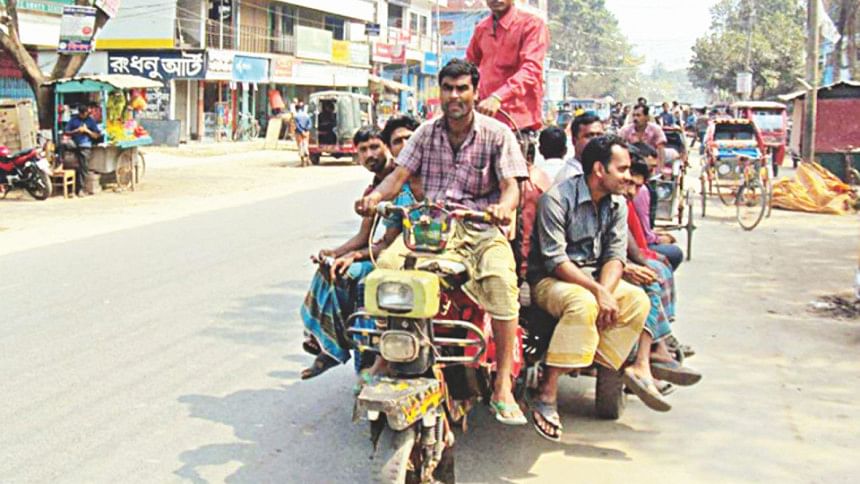How not to implement a policy

The move to ban the right to use all types of three-wheelers on highways is, over the longer term, a quite sensible and optimum one. This should lessen the heavy congestion on our highways and thus, somewhat pave way for faster movement of vehicles. Of course, the road safety authorities possess the right to determine what type of vehicles would move on what type of roads. There is also a serious concern about the road worthiness of many of the makeshift three wheelers popularly known as easy bikes. These being said, the way the decision has been rendered and the justifications offered for it begs some critical questions, especially when it encroaches on the livelihood of millions of drivers of three-wheelers and restrains the freedom of choice of many ordinary people who used to rely on these three wheelers for their daily movement.
Three-wheelers have been banned mainly for two professed reasons, namely: increasing the road safety and reducing congestion on the highways. Three-wheelers are only one of the many reasons for congestion on highways. It is also very simplistic to blame the three wheelers for the very high number of accidents on our highways. With the availability of compressed natural gas, the number of three-wheelers on our highways has significantly increased only in the last decade or so, and it is not known whether or not in proportion of the number of vehicles, the number of accidents has risen during this period compared to the past. And more importantly, who are responsible for what proportion of these accidents. Is it reckless drivers of cars, buses, trucks, or three-wheelers or reckless pedestrians or any structural issues with the highways itself? It is also not known whether freer movement of high speed vehicles would have anything to do with reducing the number of accidents. Indeed, all other things remaining as they are now, given the reckless nature of many of the drivers of high speed vehicles in this country, it is not improbable that banning three-wheelers would actually increase the ease of movement of vehicles but only at the cost of more lethal road accidents.
Another problem with this ban is its indiscriminate treatment of all types of three-wheelers irrespective of whether they are registered CNG auto-rickshaws or paperless, unauthorised vehicles. This is because, there are structural differences among the various types of three-wheelers and while some of them have at least some legal papers to move on streets, many do not have any. It is not improbable that the authorities are appeasing the demands of the powerful bus owners' association which for years (for obvious reasons) has advocated for restrictions on the movement of three-wheelers.
It is also possible that the move would only have moderate impact on fast movement of vehicles on highways. Indeed, during the Eid holidays, millions of commuters on highways would have noticed that thousands of buses, which are typically only used as town services and visibly unfit for highways, were running virtually unimpeded on highways. Often these unfit vehicles and their drivers, inexperienced in driving on highways, were contributing to the congestion on the highways. While isolated steps may have been taken, the heavy hand of authorities failed to take any visible action against this group of vehicles.
Another moral question is about the timing of the decision. The presence of three-wheelers on the highways is by no means an overnight occurrence; this is a development taking place over a decade. When something not formally condoned by law takes place for years, the law often prevents overnight overhaul of the status quo. Doing otherwise may inflict unbearable harm to the beneficiaries of the status quo. That is why the law in this country does not permit overnight forcible removal of squatters. While there may be no legal right, even squatters do acquire some vested rights. Thus, it is pathetic, that the road safety authorities have tolerated the three-wheelers for years and now have become overzealous to eradicate them from highways.
The drive against unsafe vehicles to move on the road is a legitimate step, but a drastic, all-embracing ban on all three-wheelers is a cruel blow on the livelihoods of millions and a discomfort for many commuters who have been accustomed to rely on them. If the move was a more phased one and targeted only unregistered vehicles, it would have made better sense. Similarly, over time, separate lanes on the highways (though expensive) can be another option to be explored. The poorer section of people of this country are resilient enough and over time, they would manufacture new options, but the hasty way this decision has been implemented without exploring less painful and drastic measures is not an ideal example of how to make policies. One may be excused for saying that this may serve as a good example of how not to implement a good policy.
The writer is an Assistant Professor at School of Law, BRAC University.

 For all latest news, follow The Daily Star's Google News channel.
For all latest news, follow The Daily Star's Google News channel. 



Comments